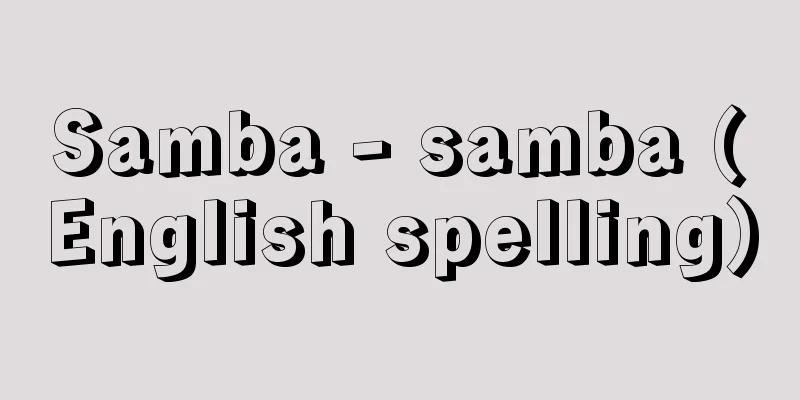Samba - samba (English spelling)

|
A collective dance, or its music and rhythm, performed by African residents in Brazil. Originally it meant a dance style of round dance (batuque) brought by slaves from Africa, but later it spread as a social dance. São Paulo's country samba is characterized by a syncopated rhythm with double beats and parallel thirds. This country samba was gradually urbanized as black people participated in carnivals, and in the 1920s, it was established as a style of carnival samba, especially in Rio de Janeiro. In the 1930s, ballroom samba, represented by samba canção (song samba), began to be danced in dance halls. The musical accompaniment varies from the simple percussion ensemble of country samba to the unique percussion groups of carnival samba to the flamboyant orchestra of ballroom dancing. Dancers sway and step vigorously back and forth. After World War II, under the influence of American popular music, samba became more modern, and bossa nova, a white urban samba, was born. [Kuniko Yui] "All About Popular Rhythm" by Kuniko Yui (1996, Keiso Shobo) [References] | | | |An annual festival of joy and ecstasy. A parade is held to the rhythm of samba. Rio de Janeiro, Brazil ©Shogakukan "> Rio Carnival Source: Shogakukan Encyclopedia Nipponica About Encyclopedia Nipponica Information | Legend |
|
ブラジルのアフリカ系住民による集団的なダンス、またはその音楽とリズム。もとはアフリカからの奴隷によって伝えられた輪舞(バトゥーキbatuque)の踊り方を意味していたが、のちに社交ダンスとしても広まった。サン・パウロの田舎(いなか)風サンバは2拍子で、3度平行の歌と、というシンコペーションのリズムを特徴とする。この田舎風サンバは黒人がカーニバルに参加することによってしだいに都会化され、1920年代には、とくにリオ・デ・ジャネイロでカーニバル・サンバとしてのスタイルを確立した。さらに30年代に入ると、サンバ・カンサウンsamba canção(歌謡サンバ)を代表とする社交ダンス化したサンバがダンスホールで踊られるようになる。 伴奏形態は、田舎風サンバの簡単な打楽器アンサンブルからカーニバル・サンバにおけるサンバ独自のパーカッション(打楽器)群、そして社交ダンスの華麗なオーケストラに至るまでさまざまである。踊り手は体を揺すりながら、前後に激しくステップを踏む。第二次世界大戦後、アメリカ合衆国のポピュラー音楽の影響を受けてサンバはより現代的になり、都会の白人向けサンバとしてのボサ・ノバが生まれた。 [由比邦子] 『由比邦子著『ポピュラー・リズムのすべて』(1996・勁草書房)』 [参照項目] | | | |年に一度の歓喜と陶酔の祭典。サンバのリズムにあわせ、パレードが繰り広げられる。ブラジル リオ・デ・ジャネイロ©Shogakukan"> リオのカーニバル 出典 小学館 日本大百科全書(ニッポニカ)日本大百科全書(ニッポニカ)について 情報 | 凡例 |
Recommend
Higo Province
The old name of the province that covers the enti...
Umbrella - Umbrella
A type of headgear. It is generally made into a l...
Date palm - Date palm
A species of the genus Phoenix in the palm family...
Pavel I - Pavel
Russian Emperor (reigned 1796-1801). The eldest so...
New Selection of Writings - Shinsenjikyo
A Japanese-Chinese dictionary in 12 volumes. Comp...
balata
…Japan imports the entire amount. A similar subst...
Partner - Aikata
1. Someone who does things together. Especially a ...
Colobus monkey
A general term for Old World monkeys belonging to ...
Broomrape (English spelling) Orobanche coerulescens; broomrape
An annual herb of the Orobanchaceae family that pa...
Suebi
...Also, from 113 to 101 BC, the Cimbri and Teuto...
Stone Pagoda Yoshifusa - Ishido Yoshifusa
Dates of birth and death unknown. A military comm...
The Hidden Husband Theory - Senpro
Wang Fu (date of birth and death unknown), a Conf...
zortziko
...There are many other folk songs with beautiful...
General Association of Korean Residents in Japan - Zainippon Chosenjin Sorengoukai
A Korean organization in Japan that supports Nort...
Cocoxochitl
...The flower is a head of many tubular flowers w...









